Business / Global
Coming of age
New restaurants tend to reap the plaudits and column inches but those that have stood the test of time have valuable lessons to impart. Here we meet the restaurateurs behind fledgling ventures and venerated institutions with decades of experience to find out how they set up shop, stay ahead and endure.
Newly opened
Atoboy
New York
After opening its doors in 2016, Atoboy quickly made a name for itself in Nomad with its three-dish prix fixe Korean fare. Husband-and-wife team Junghyun and Ellia Park decided to focus on Korean banchan, the side dishes that accompany meals. They’re normally free, while here they come at a price – but are well worth it. In the stark interior, Junghyun serves the seasonal menu while Ellia runs a polished service. With their second outpost, Atomix, recently opened, Ellia tells us what inspired the pair to strike out on their own.
atoboynyc.com
MONOCLE: How did you set up?
Ellia Park: Junghyun and I studied hospitality in college and, while building our experience in kitchens around the world, we always dreamt of opening our own restaurant. Atoboy was born because we felt that New York, a relatively new home for us, could be the perfect audience for our take on Korean cuisine.
M: How important was choosing the right space?
EP: There were a lot of factors to consider, such as the location and size of the restaurant, as well as our service style, menu and price point. We examined the market and its demographics, as well as our space, to determine the labour needs and the volume of customers it can hold daily. It’s crucial to aim for the rent to be about 10 per cent of the total net sales to maintain a healthy sheet balance.
M: Was there a time when you felt like it wouldn’t work?
EP: I try to learn from my flaws as I set high expectations for myself and the team. For instance, at lunch the hours of operations are much shorter and price ranges are limited. Our short-lived lunch programme was a bit pricey and many items took a long time to prepare. We decided to forego the lunch business and open up Sunday dinner service instead. When running a business, it’s crucial to be able to make decisions quickly.
M: What are your tips for those looking to start out themselves?
EP: You have to find the balance between what you like, what you’re good at and what your guests want. You can’t just do the things you love, but you can’t make decisions based solely on the myth that “customer is king” either. It’s good to have the pure and simple desire to open a restaurant but it’s equally important to have a concrete plan.
5 years+
The Clove Club
London
Daniel Willis, Isaac McHale and Johnny Smith met at a boat party in Croatia in the summer of 2010. Shared interests in music and food eventually brought them together to start working on a private supper club in London. Three events into the schedule, the team decided to settle into a permanent, bricks-and-mortar space – and The Clove Club was born. The restaurant opened in 2013 inside a former town hall in east London’s Shoreditch. Many took notice of the British-inflected fare and within 18 months it had a Michelin star. We speak to two of the co-founders (also behind Luca in Farringdon) about how they turned a crowdfunding campaign into a leading light of London’s restaurant scene.
thecloveclub.com
MONOCLE: How did you set up?
Daniel Willis: We didn’t have much money – and we opened way over budget with the small budget we did have. Crowdfunding was a great way to start off: the equity worked out well. If we had had one large investor we would have been much more beholden to them. It was a very communal thing. Friends and family, as well as people who had been to our events, all got involved. We opened with £250,000 [€289,000] – people are shocked that we made this happen with that amount. But our original tables were made by a guy we met on a train on the way to a wedding in Cornwall, who just happened to be a carpenter; our friend came down from Manchester to do all the painting and decorating. We begged, borrowed and stole to make it happen.
M: What experience was most relevant to starting out?
DW: All of the stress of doing one-off events was our guerrilla training. I studied business at university, which gave me a general understanding of how things work. Isaac is an all-rounder: he just loves restaurants. He had been working in Michelin-starred kitchens for 20 years so was the only one of us who had lots of experience.
M: What was the main challenge when you opened?
DW: We were frustrated because people didn’t take us seriously; we were just labelled as another hipster restaurant in Shoreditch. The first two-and-a-half years were stressful. We tried to move forward but the business was developing faster than we could react to it. That has plateaued now but we keep trying to revisit what we do. Now we’ve got to the point we would have liked to have been at when we started. From the operational side of things it’s about co-ordinating a dozen people to always set up the restaurant in exactly the same way. When you’ve never done that before it takes time and effort to do all the little things.
M: How important is location?
Isaac Mchale: We were lucky to see this site. It is owned by the council and rented to a charitable trust, which in turn rents out part of it to small firms. The income then helps to subsidise bringing the rest of the building back to life. The great thing was that we didn’t have a commercially minded landlord who was trying to extract as much revenue as possible so we were able to afford these high ceilings and this grand room inside a Grade II-listed building. With the money we had we might have ended up taking over a small former Indian restaurant or a greasy-spoon café somewhere and it would have been a very different story.
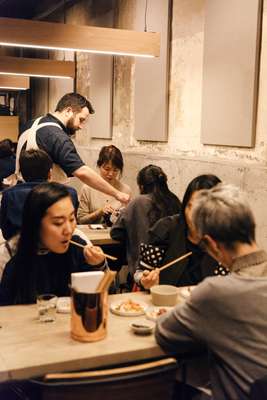

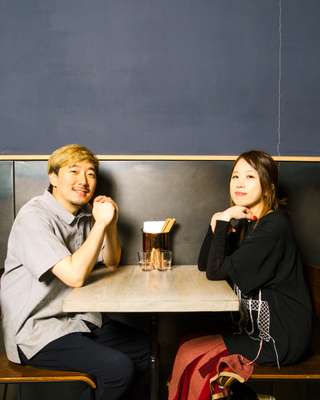
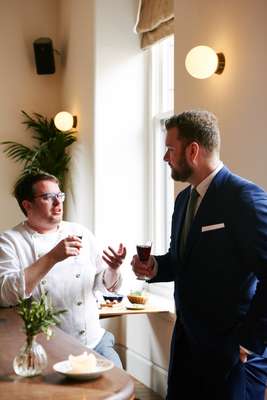
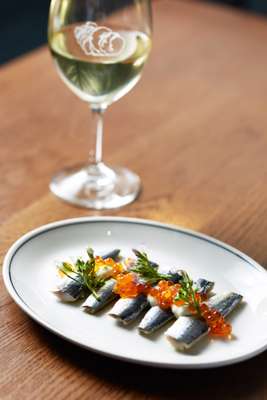
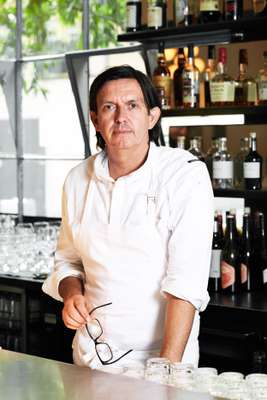
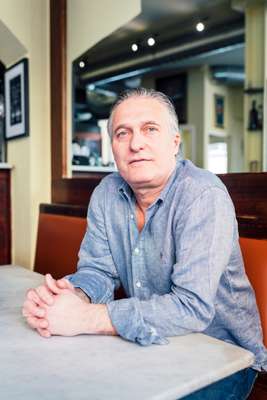
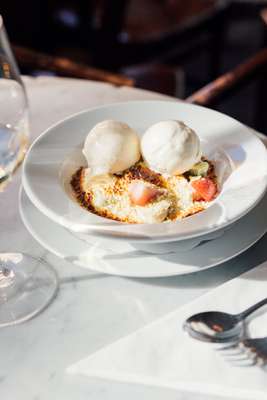
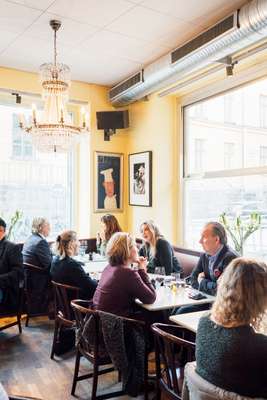
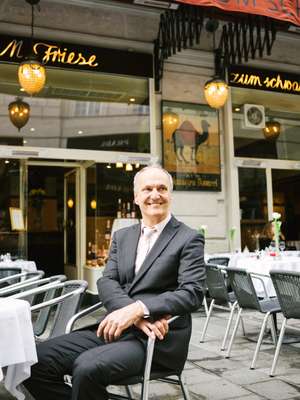
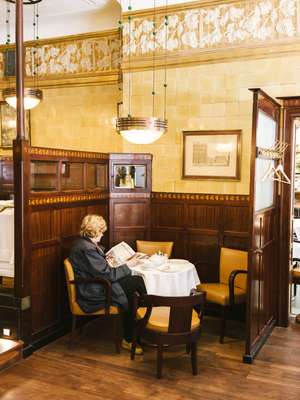
M: What are your tips for those looking to start out themselves?
IM: Take the long route. There’s no substitute for putting in the time, for 10,000 hours of doing something. Go and work for the best people and learn to listen before talking.
10 years+
Cumulus Inc
Melbourne
Before he opened Cumulus Inc in 2008, all of restaurateur-cum-chef Andrew McConnell’s Melbourne ventures were fine-dining establishments. But he found himself yearning for something different, something with a more casual atmosphere, a menu that would satisfy his preferences and opening times that reflected his penchant for a late lunch. Nowadays Cumulus Inc has been joined by others in the McConnell pantheon but it remains unchanged in its 07.00 to 23.00 hours and unparalleled in its ability to tempt the crowds on busy Flinders Lane.
cumulusinc.com.au
MONOCLE: What was the biggest challenge when you opened?
Andrew Mcconnell: A lot of the challenges we faced were site-specific. Cumulus Inc is in an old rag-trade building, which was later an art gallery for about 20 years before we took over. Taking a building that was fragile and upgrading it in a way that was sensitive to the structure was very difficult.
M: After 10 years, what stays the same and what needs to change?
AM: The only things that have changed are some of the physical elements of the restaurant, which is to be expected after about 10 years of wear and tear. In broader terms, it wasn’t until we were one year into trading that I was content with what we were doing and how we were delivering it. It took time for it to gain traction and for people to feel comfortable using it however they wanted and how I had intended. The idea was to open an accessible, high-standard restaurant without all the rules that come with fine dining. People use Cumulus Inc for many reasons and that’s partly why we’re still here today.
M: As a serial restaurateur, do you still get nervous?
AM: It doesn’t get easier. I last opened a restaurant a year ago and still question what it is I’m doing. It takes time for a restaurant to take shape; an opening takes a night but to really open a restaurant takes a year. When you start a restaurant you think about getting through the first 12 months, not about what’s going to happen in 10 years. But being 10 gives us the opportunity to look at this space with confidence and longevity, and think about investment in the space and the business. I’m not saying we should renovate to make it more up to date with modern trends – I think that one of the keys to Cumulus is the fact that we haven’t renovated.
M: How important is location?
AM: I always believed that people would travel for good food. However, when you want people to use your restaurant from 07.00 until late, location is important. People need to be able to drop in for a coffee but also come to dine. Before Cumulus I worked in fine-dining restaurants and with those the location could be more obscure, more of a destination. But if you need to be busy and be accessible, the location is vital.
30 years+
PA & Co
Stockholm
In the 32 years since Nicklas Ericson and his brother Hakan opened their restaurant on the corner of a steep Östermalm street, the fortunes of Scandinavian food have soared. But the brothers have focused on Swedish fare since 1986. Their delectable approach to fresh produce and changing menus felt revolutionary upon the restaurant’s opening – and was a precursor to much of what was to change on Stockholm’s dining scene.
paco.se
MONOCLE: What was the biggest challenge when you opened?
Nicklas Ericson: At the start we were all very young: I was about 24 and my brother was just 21. The other pair were also in their twenties. All of us were chefs but had no experience of running a restaurant and serving on the floor. In the mid-1980s, Swedish restaurants were rigid. There was ordinary food and then there was restaurant food. At that time French cooking was very popular but we were doing Swedish country food. We changed the menu every day, serving food that we liked to eat and doing it in a much less stiff and formal way. It attracted young people mainly; we became a small meeting place for artists, musicians and actors. In the 1980s and 1990s, PA & Co was more like a bar. We were rebels at the time but are more of an institution now. It’s fun that the children of those who used to be regulars 20 years ago are coming here now.
M: How did you set up?
NE: We borrowed sek3m [about €600,000 today] from the bank, which is an enormous sum when you’re 24. My mother said to me, “Why would you do this? Can’t you just be a chef somewhere else?” She thought it was mad. But we were working seven days a week and paid it back in one-and-a-half years.
M: Can you describe a time when you felt like it wouldn’t work?
NE: At some point around 2000 we became part of a conglomerate. As a small piece in a large puzzle, we felt that we were losing our identity. Soon after that we jumped off the big ship and bought back this little place.
M: How much has changed over the past 30 years?
NE: The principle is the same but today we have three sommeliers. At the start we didn’t think about wine but today it’s 40 per cent of our sales. You evolve at the same pace as your surroundings and your clientele. If you’re way ahead or way behind you lose everything.
M: The way we eat has changed over the past 30 years or so, as has the reputation of Swedish food abroad. Has that affected you?
NE: When we started in the 1980s, new produce such as fresh vegetables, herbs and spices started arriving in Sweden. It was the first time we could work with them. We didn’t have fresh garlic – you could only get garlic powder in Sweden in winter. It’s easier to be a chef now, with all the produce you can find around Stockholm. You don’t have to buy lamb from New Zealand anymore.
50 years+
Zum Schwarzen Kameel
Vienna
Zum Schwarzen Kameel is a Viennese institution. The 400-year-old venue, which comprises a wine bar, dining room, deli and confectioner, draws a mixed clientele that raves year after year about the fine food and original art nouveau space. Kameel has been in the hands of the same family since the 1950s and has had ups, downs and updates along the way. Owner Peter Friese explains how the restaurant has adapted and thrived over past several decades (and across centuries).
kameel.at
MONOCLE: How did you set up?
Peter Friese: My parents took over in 1957 and everything was already here. The building was rebuilt in 1901 in the art nouveau style. That style, however, was completely out of fashion by the 1950s. People would say, “We can’t eat in a bathroom” and they’d leave. So my parents painted the tiles white and reduced the decorative elements. In the 1990s art nouveau was back in and we scraped the paint off; since then it’s been like this.
M: When did you take over?
PF: It was a gradual process. I’ve been here since 1977, and was official owner early in my career, but my parents were the bosses to the outside world until they died. I was Herr Peter. My mother also launched our now-beloved small sandwiches.
M: What experience did you have at the time?
PF: I did work in the Hotel Bristol. But then I’d come and wash dishes here. I grew up here. I have two boys and I’d like to teach them about the restaurant. They’re growing up here too. They see the kitchen, everything.
M: How important is location?
PF: Incredibly important. Bognergasse is a main thoroughfare now but it wasn’t always a good street; in the 1970s it was where old ladies walked their dogs. Only in the past 25 years has it improved; the Golden Quarter shopping area made it better still.
M: Can you describe a time when you felt like it wouldn’t work?
PF: A hundred thousand times. In a restaurant with such high turnover, even one slow day a week will give you problems. We have occasionally had to hire more employees or let them go. We’ve made mistakes, such as getting too ambitious with our catering service. Now we do only as much as one cook can handle, and primarily for regular customers. It’s better if I’m here; regulars are reassured when I am.
M: What are your tips for those looking to start out themselves?
PF: Always watch for quality. Every product should have a story and be unique. I have very carefully chosen everything we sell. Things change and you have to adjust with the times. We took out a wall that separated the dining room and the sweet shop to accommodate people. Dining has changed. These days people want to see others and to eat in an airier space with more light and movement.


